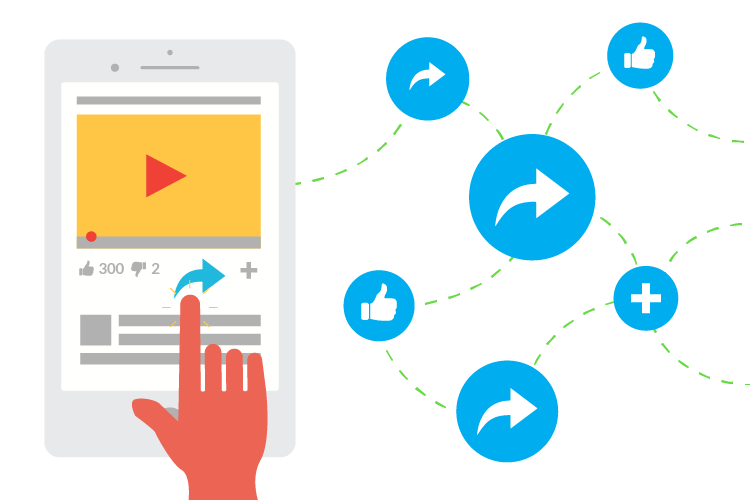This article originally appeared on the Prime Design Solutions website.
The value of content marketing has been proven for years – increased search engine optimization (SEO), fodder for social media and email marketing, team enrichment and more (for even more on this topic, see our blog post). But are you tapping into the potential reach for the content you’re creating? After all, the hard work is essentially done – you’ve developed an idea, wordsmithed it, gone through rounds of revisions and created supporting media – how can you get even more people to see it?
The answer lies in sourcing the help of others. And the way that is done is through sharing.
We’re all familiar with the power of word-of-mouth recommendations. When someone you trust raves about, say, a new restaurant, you’re much more likely to act on that recommendation than if you see an ad. So when you get others to share your content, you are tapping into the same benefits — but in way that is persuasive, less invasive and likely more frequent.
Shareable content provides a few very specific benefits:
- More people are exposed to your brand.
- The person sharing is essentially providing a low-key endorsement for your firm and its expertise.
- Additional exposure increases clicks and SEO ranking of your site (or wherever the content is posted).
- The likelihood of other content you’ve created being seen increases too.
Of course, content that is guaranteed to be spread widely is not something you can order up on a plate — which is why no reputable ad agency will promise to create a “viral campaign.” The best you can do is create content in such a way that it has every chance of gaining legs. In order to do that, you have to add “shareable” to your list of primary objectives for the generated piece. Here are a few things to keep in mind.
Usefulness
The only way something you create is going to be passed along through another person’s social media channels is if it provides some degree of value. That value can come in many forms – specific information to solve a challenge, an alternative perspective, or even something as simple as entertainment and engagement.
But the main takeaway is this: people need to be able to grasp the usefulness of the content before they will pass it along.
How can you do that? Assuming that the core of the content is inherently worthwhile, you need to think of ways you might more easily connect with someone. Images are the first place to look. Stock images are fine, but better yet is the creation of a brand-new, eye-catching photograph or graphic that compliments the message.
Better yet, use the associated visuals to reinforce the value within the content. Charts and infographics excel at this task by providing readers with an visual method for grasping concepts and facts central to the narrative. A good rule of thumb is to break up content with a supporting image approximately every 100 words.
Another media that drastically increases readership is the inclusion of video. Video creates a rich experience that’s easy for your typical content recipient to consume. Depending upon your industry, video can increase sales markedly. For example, over 25% of customers would prefer to watch a video about a product than to simply read about it.
Platform is a key element in creating shareable content. Where are we hoping people will pick up on the information we are publishing? If it’s on a social medium like Facebook, it’s worth noting that content accompanied by an image or video is far more likely to be shared versus that same content presented in a text-only format.
Consumable
Content that is presented in a way that is quickly and easily digested and understood is far more likely to be shared. Shareable content is, generally speaking, not an in-depth white paper study of a chosen topic. It is something that quickly identifies a problem and begins delivering solutions in a way that’s easy to understand.
If the content is easy to understand and of value, we have now added another key factor: motivation. On and offline, people are wired to want to share information. Whether that is from a place of altruism, where they really want to help a friend; self-image, where they want to help boost their own personal brand as the one with all the answers; or entertainment, where they enjoyed something so much they want to interact with it.
Mobile-friendly
The majority of shared content is consumed and shared on smartphones. Therefore, it makes sense for us to prioritize the experience of the mobile user. This influences content length. Smartphone users prefer shorter content. Studies have shown that ideally, copy length should be targeted at fewer than 1,000 words if one of the primary objectives is for it to be shareable.
Again here, video serves us well. At this point, more than half of all video content is viewed on a mobile device. This is due to the fact that streaming video content is convenient and reliable. But more so, it is wanted. And that’s the real key to shareable content – creating and distributing information that people want. Keep it interesting. Engage the viewer (some of the most shared content is presented in the form of a quiz). Make it easy for them to show others.
How do we make sharing easy?
First, we follow standard practices of Marketing 101 – we ask viewers to share. And we give them an easy way to share, such as including share buttons in our email newsletter. And we provide them with access to even more content of this caliber.


